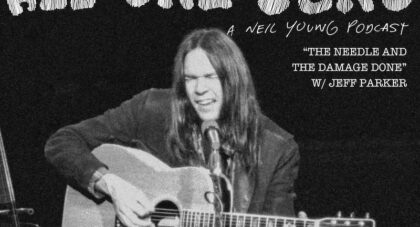This Friday, September 30th will see the release of the eleventh studio album by the Drive-by Truckers. American Band is a tight, dark album comprised of the type of songwriting that Patterson Hood and Mike Cooley have excelled at for years - specific stories that explore and reverberate through universal ideas. While the band has often examined political and social ideas freely via individual songs, American Band marks the first time Drive-by Truckers have explored and documented these ideas an album length statement. Aquarium Drunkard talked with Hood and Cooley separately by phone about the new album, what it means to make an entire record like this, the troubles of getting an album on to a single LP, and why we just need to love each other, motherfuckers.
Aquarium Drunkard: One of the biggest notes about this album ahead of time is that American Band is a pretty explicitly political record. You guys have written political songs before - "Putting People On the Moon" for instance - but it's never dominated an album the way they do here. Was there any hesitation on your part in approaching a record in that capacity?
Patterson Hood: I've always thought of our music and our songs as political. I was kind of taken aback by how many people seem shocked by the political nature of this record because I've always felt that way about our music. Especially "Putting People On the Moon." At the time that came out, it really polarized a lot of people. When we were touring behind The Dirty South - which was at the height of the 2004 Bush-Kerry election - there were people really irate about that song every night. Every single night we had people shooting us birds and yelling shit at us when we played that song. And then it just went away. We kept playing the song and people stopped reacting that way. I don't know if those people just left, or just got used to it, or if the election was over and they moved on. I don't know. I never even questioned it. I just noticed it.
Mike Cooley: I wasn't too worried about it. I figured we'd lose a few people, but I've never been worried about getting Dixie Chick'd. We never had a huge country radio, right wing audience anyway. And the threatening comments that are bound to come, I'm not worried about those either, but you can't write those songs, you can't pay enough attention to that subject matter without knowing how people might feel about it.
PH: And there's always been that aspect. "The Living Bubba" - even though the lyrics say "I've never had much use for politics" - I've always considered that to be a political song. The fact that people were still dying of AIDS in 1996, 15 years into the crisis and 20 years into the disease itself - people were still dying; especially people who didn't have the money for the best health care. I've always considered all of that part of what we do.
I guess the big difference with this record isn't how political it is, but the lens it's shot through, to put it in movie terms. I'm always using the parallel to the movie Chinatown which is one of my all-time favorite films. It was such a product of its time. It was all about the social and political mores of the early-to-mid 70s and yet it was set in the 30s. We've always done that with our work - we've done a lot of period pieces, which has never been en vogue in rock and roll, yet we've always delved into that. "Putting People On the Moon" which we put out 12 years ago was set in the 80s, even though I considered it more than timely in 2004 during that presidential season. That song talked about Reagan, it talked about political decisions made in the Reagan era that were still affecting people in 2004 and 2016. Likewise, Southern Rock Opera, which was set in the time of my coming of age - in the 70s against the backdrop of the rise-and-fall of arena rock and Watergate and [George] Wallace and the post-Civil Rights South - to me, that was still relevant when we wrote it which was now 20 years ago. That record and this record have a lot in common even though they're musically world's apart to be from the same band. There's a lot we were talking about on that record that we're still talking about with this album, just maybe in a more grown-up way.
Only the good shit. Aquarium Drunkard is powered by its patrons. Keep the servers humming and help us continue doing it by pledging your support.
To continue reading, become a member or log in.


